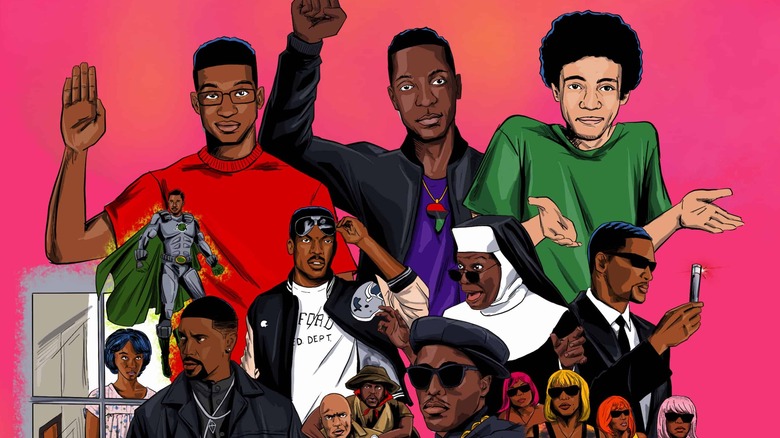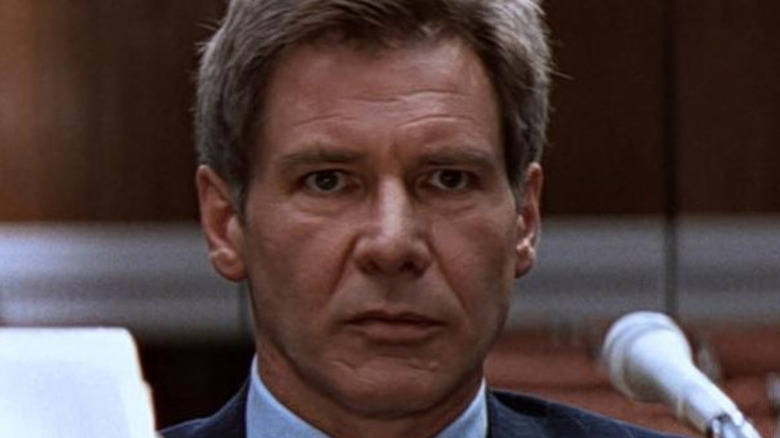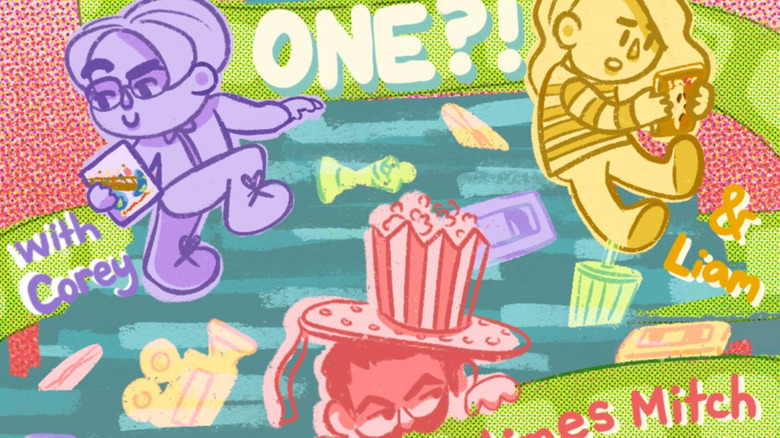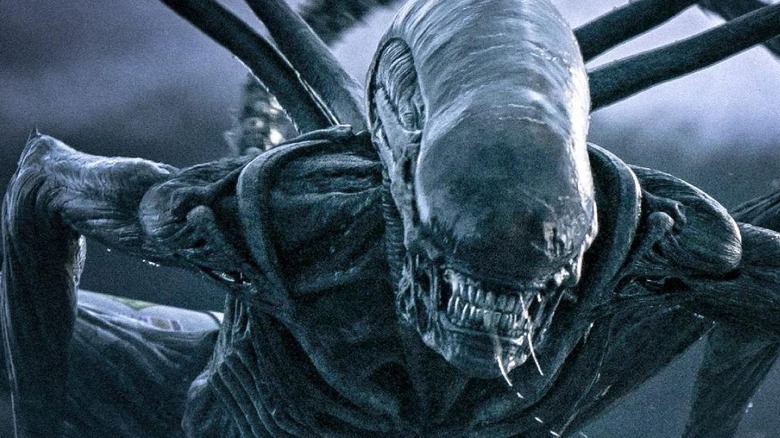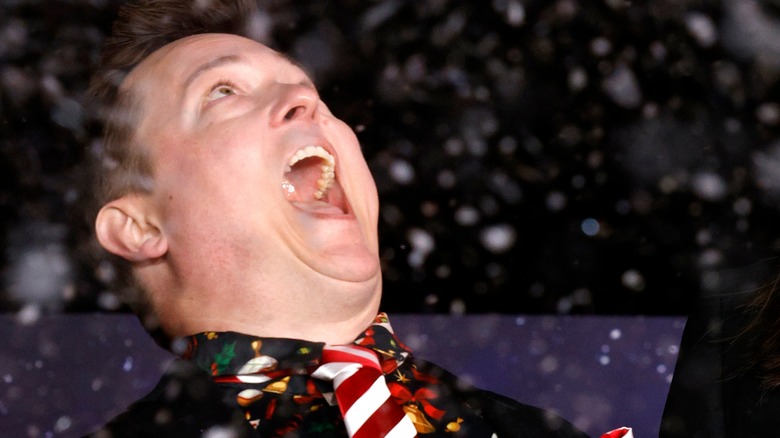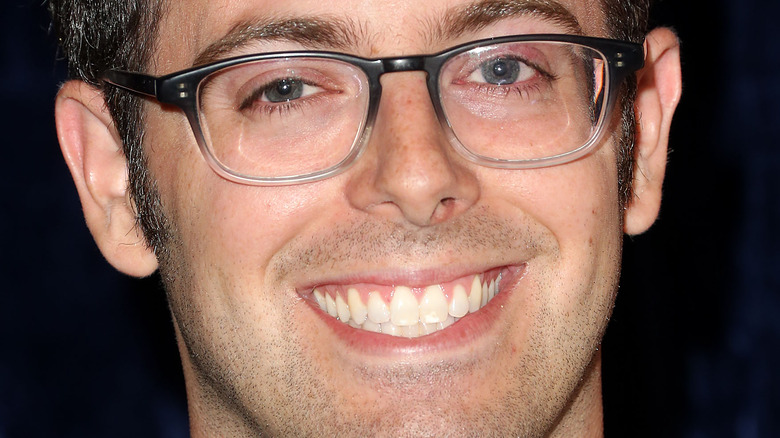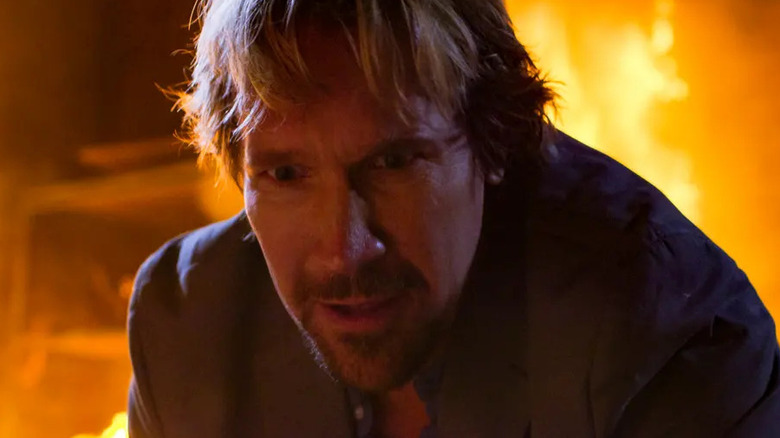The Best Movie Podcasts Of 2022 Ranked
Podcasts have been around since the early 2000s, but these days, they're more popular than ever before and have essentially phased out radio shows as the dominant way to entertain and reach a wider audience of listeners (with some of the old guard radio personalities, like Howard Stern, getting his own podcast as well). And it makes sense, as the internet allows for many different types of people to get their voices out there, due to the relatively low cost of entry, as well as many more avenues for cheap – or even free – distribution, which wasn't the case in the days of radio decades earlier. This allows for more diverse and niche communities to have their own shows, which helps democratize the space.
This includes the advent of film-centric podcast shows. Not that movie-specific radio shows didn't exist prior to this, but the aforementioned relative ease of users being able to create and distribute their own podcasts on various platforms allows for a vast array of film content – and types of voices – to be heard on the internet. Whether it's a show about a singular film franchise, one discussing an artist's entire body of work, or a podcast simply about people watching bad movies for the heck of it, there's a little something for everybody.
So what are some of the best movie podcasts to come out in 2022? Let's find out.
You Must Remember This
The entertainment industry is full of many untold – or long-forgotten – stories, trends, and behind-the-scenes drama that is, well, worth remembering. And that's where the aptly-titled "You Must Remember This" podcast, hosted by film critic and author Karina Longworth, comes in. What's great about "You Must Remember This" is that much of film history – like any history – tends to get easily forgotten or gets consumed by legend and conjecture. The podcast reminds its listeners how important it is to always be diligent about the truth, even if it's upsetting, absurd, or both. This includes stories like the unsung Hollywood heroine Polly Platt, our fascination with dead blonde celebrities like Marilyn Monroe, and secret history MGM Studios – among many others.
Overall, "You Must Remember This" is well-researched, with tons of sources listed in a tidy bibliography in the description of every episode. Ultimately, this podcast is a must-listen for those interested in history, film, and the intersection of sociological, anthropology, and politics. To add to that, Longworth is a great host who's able to make these often convoluted and complicated legacies pop with energy and enthusiasm. In 2022, she embarked on the history erotic thrillers from the '80s and dives into the origins of the trend, why they ultimately died out, and what influences they still have on pop culture today.
Black Men Can't Jump (in Hollywood)
Despite an increase of diverse representation in Hollywood productions recently, it's still not nearly enough, especially when compared to the number of roles given to white actors, particularly in lead roles (via statista). Luckily, the podcast "Black Men Can't Jump (in Hollywood)" discusses Hollywood films through the lens of black-led films throughout film history. The podcast, which debuted in 2015, is hosted by the charismatic and hilarious Jonathan Braylock, Jerah Milligan, and James III – all actors, writers, and producers in the industry, best known for Netflix's sketch comedy show "Astronomy Club," though their individual credits also include "Grown-ish," "Broad City," and "Big Mouth" – on top of many, many more.
This crew takes a much needed microscope to Hollywood's spotty – to say the least – efforts at diverse representation, especially for Black leads in film. Also, being in the entertainment industry themselves, the hosts are able to look at the films through other angles as well, such as the intersection of specific genre trends, outside politics, and entrenched systemic biases in films and the culture at large. But, despite the sometimes dire and serious topics raised in the podcast – due, again, to Hollywood's troubled history with Black representation on film – the show is nonetheless able to be a delightfully fun listen as well. The hosts all have great, friendly chemistry with each other, and are able to make the topics light and comedic, on top of being informative.
Newcomers
There are tons of nerd-centric film podcasts on the internet, which discuss and analyze in detail the various nuances and idiosyncrasies of franchises like "Star Wars," "The Lord of the Rings," the Marvel Cinematic Universe, etc. However, most of them are from longtime, die hard fans who passionately (and often loudly) rant about weird continuity errors, obscure trivia, or why the franchises aren't as cool as they used to be. This is why "Newcomers" is so refreshing. It began with comedians Nicole Byer and Lauren Lapkus watching the original "Star Wars" trilogy from the perspective of people who never grew up with it or had nostalgia for it. This allowed for them to have a unique perspective on the pacing, story, and characters, as opposed to how fans steeped for decades in lore would.
They then moved on to the "Lord of the Rings" trilogy, "The Fast and Furious" films, and lately going through the Marvel Cinematic Universe. As always, hosts Byers and Lapkus bring new – and often hilarious – ways of thinking about these sometimes over-discussed franchises, which gives their analysis a fresh feel. It also helps when they bring on more knowledgeable guests, such as uber-nerd comedian Patton Oswalt or the opinionated Jon Gabrus, who can provide humorous contrast – or even have their opinions changed, or at least challenged, by either Byer and Lapkus in the process.
Unclear and Present Danger
It's pretty clear that we're in a pretty dire time, politically, right now — but if you look back at the 1990s (the time between the Cold War and 9/11, to be specific), it's actually a fascinating, and pivotal time period in American politics that's rarely discussed in-depth. That's where the podcast "Unclear and Present Danger," hosted by Jamelle Bouie (columnist for the New York Times) and John Ganz, comes in. The podcast covers political thriller films from the '90's – a type of film that's a bit out of vogue now, but was much more prevalent back then – to get some insight on the political atmosphere of the time. In fact, "Unclear and Present Danger" is a play on the 1994 Harrison Ford thriller "Clear and Present Danger." Meanwhile, Bouie and Ganz analyze what the films of the time were afraid of, what morals they prioritized, and what messages they were sending with the politics of their narratives.
The two hosts are very knowledgeable about politics and entertainment, and the podcast benefits from how they can authoritatively discuss the intersection of both at the time. "Unclear and Present Danger" is also often very funny, especially when they have to deal with the mediocre action thrillers of Steven Seagal like "Under Seige."
They Made Another One?!
It's no secret that most of the movies that get greenlit these days is based on some sort of pre-existing intellectual property. Whether it's unnecessary sequels, barely-related TV series adaptations, or unwanted remakes, you can find out it probably exists out there somewhere if a movie makes enough of a profit (and sometimes not even then).
This subject gets a closer look on "They Made Another One?!," which is hosted by Corey Price (who also co-hosts the "Mortal Kombat"-related "MK Podquest" and the F1 podcast series "Strat 2") alongside his two friends Liam and Mitch. On the podcast they all hilariously discuss, analyze, and skewer the various aforementioned tangentially-related pop culture artifacts. This includes episodes on 2016's "Punk's Dead: SLC Punk 2," 1993's "Maniac Cop III: Badge of Silence," and the 2001 "Metropolis" anime adaptation. Furthermore, beyond helping listeners with obscure trivia about films they probably didn't know even existed, the podcast is just really fun to listen to. The hosts are all long-time friends with laid back vibes, gut-busting recurring bits, and a deep, abiding, and infectious love of film.
Crew Expendable
There have been many podcasts over the years that cover entire movie franchises, from "Star Wars Minute" to "The Worst Idea Ever," and so on. However, one of the more recent – and extremely hilarious – film podcasts in that vein to pop up and grab our attention like a Xenopmorph face-hugger is "Crew Expendable," based on the "Alien" franchise. In fact, "crew expendable" refers to what the Weyland-Yutani corporation designates the members of the USCSS Nostromo in the first "Alien" film.
"Crew Expendable" is hosted by two self-proclaimed "xenodorks," Neal Hallstrom (who also co-hosts "MK Podquest" with Corey Price from "They Made Another One?!") and Kenny Rohrbacher. The podcast itself chronicles the entire "Alien" film franchise, as well as all the accoutrements that have since emerged from it. This is because the podcast covers not only every single film in the franchise, but also the comics, video games, crossovers, DVD bonuses (like those weird, young Peter Weyland TedTalks from "Prometheus"), and everything in-between. The podcast is basically tailor-made for fans of all things "Alien." And, like a lot of the podcasts on this list, it is mainly the chemistry between the hosts that is the main draw, with Neal's laid-back, hilariously dry energy contrasting well with Kenny's odd vocal rhythms and even odder takes.
Best Movies Never Made
There are so many unmade movies in Hollywood, with only a fraction of them being produced when compared to how many start development. This is because so much has to go right for a film to get finished, while conversely it is so easy for it all to go wrong on the way from the first pitch, to the initial greenlight, to production, to even the distribution (just look at "Batgirl," which won't see the light of day despite being completed). Often, these failed projects go unsung and forgotten, or rumors and conjecture end up turning this unmade projects into legend – justifiably or not.
Luckily for cinephiles, there's the podcast "Best Movies Never Made," hosted by screenwriter Josh Miller (who wrote the scripts for the two "Sonic the Hedgehog" films and the holiday action film "Violent Night") and researcher Stephen Scarlata, who produced the great documentary "Jodorosky's Dune." The two hosts then go through and discuss all the biggest unmade projects, and finding out what happened to them through thorough research as well as recapping the scripts and even interviewing the writers behind some of the projects. Beyond the in-depth research, hosts Miller and Scarlata also have a great, easy-going vibe that makes the production histories entertaining to listen to, as well as being informative.
Blank Check
In Hollywood, the term "blank check" refers to when a filmmaker has had a massive financial or critical success and are then offered the opportunity to pursue their passion project – which can either clear (become a success) or bounce (flop). The term itself is defined as "an unlimited amount of money, or the freedom to do anything," via the Cambridge Dictionary. This, of course, is not to be confused with the 1994 family comedy film "Blank Check," starring Brian Bosnall and written by screenwriting guru Blake Snyder of "Save the Cat" fame.
"Blank Check" is also the name of the popular comedy podcast hosted by two friends, Griffin Newman ("The Tick") and The Atlantic film critic David Sims. The podcast, originally a "Serial"-type deep dive on the "Star Wars" prequels, has since evolved into talking about the various aforementioned "blank checks" from famous filmmakers. These include episodes on George Lucas, the Wachowski sisters, Steven Spielberg, and the works of Henry Selick. Even better, the podcast has also gone out of its way to spotlight more diverse voices, like Gina Prince-Bythewood, Jane Campion, John Singleton, and Nora Ephron. The constant hilarious banter between the two hosts, the barrage of extremely nerdy deep-dive trivia, and the earnest love of films and the magic of storytelling they celebrate makes the podcast a must-listen for any true film fans. Well, any true film fans who can handle two-plus hours discussing movies like "Space Jam."
The Flophouse
"The Flophouse" is a "bad" movie podcast co-hosted by ex-"Daily Show" and "Mystery Science Theater 3000" head writer Elliot Kalan, current "Daily Show" writer and Kalan's former co-worker Dan McCoy, and their cool friend and bar owner, Stuart Wellington. Together they skewer bad movies that flopped (sometimes only critically, as on occasion the films they cover happen to be box-office successes), while also spending just as much time – if not more – on hilarious and off-topic comedy bits.
The Flophouse stands above other "bad" film podcasts thanks to rapid fire jokes and the great, sincere camaraderie among the three hosts. They each have their own distinct and defined personalities, with Dan as the dry-witted straight man and host of the group, Elliot Kalan as the rapid-fire motormouth, and Stuart as the laid back cool guy of the group (and arguably the funniest, despite not writing for famous comedy shows). Regardless, while the personalities and friendship between the three hosts are the obvious main draw of the podcast, there are also some great aforementioned comedy bits throughout as well.
God Awful Movies
There's been a rise in overtly Christian faith-based films lately, and the podcast "God Awful Movies" chronicles and justifiably ridicules them. The "God Awful Movies" podcast began as an off-shoot of "The Scathing Atheist" podcast, hosted by Noah Lugeons, Heath Enwright, and Eli Bosnick, who also return for "God Awful Movies." It was inspired by the Cracked article "6 Pro-Christian Films That Made Christians Look Like Jerks," written by Madeline Maye (credited as Matt Fazio), Adam Koski, and Tara Marie, which featured the insane low-budget "what if Jesus existed in modern times" film "Miracle Man" that ended up inspiring the pilot episode of "God Awful."
What makes "God Awful" movies such a great podcast is the hosts' unrelenting and hilarious take downs of these films. Not only are these films often incompetent on simply technical levels (shoddy camera work, barely audible audio, little-to-no-extras, etc.), but they also just as often have insidious messages in them as well. To be clear, this is not an indictment on religion in general, but rather the regularly regressive (i.e. racist, homophobic, and misogynistic) politics of films that are specifically marketed for a solely faith-based audience, which the "GAM" crew absolutely skewer.


